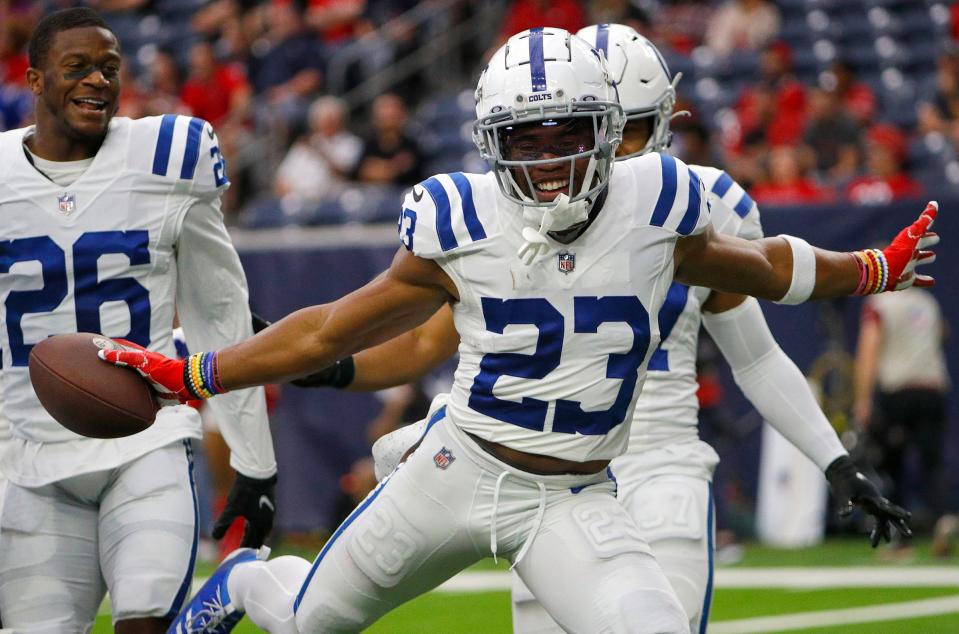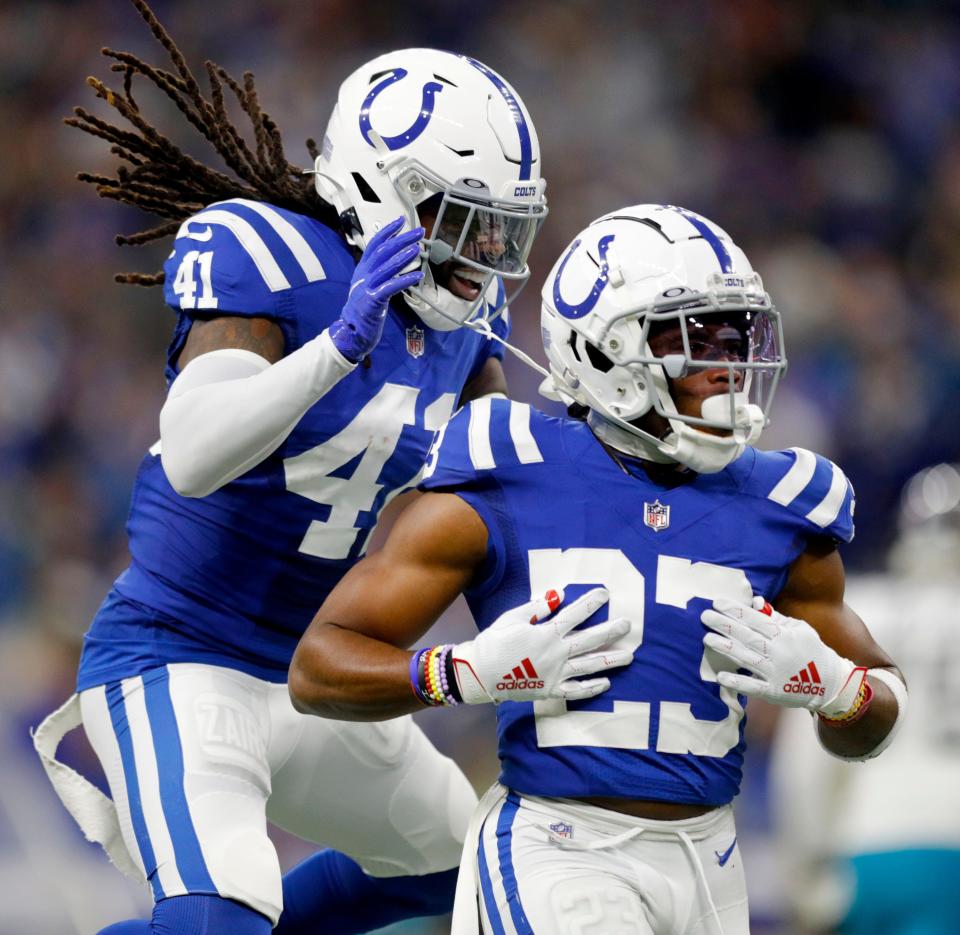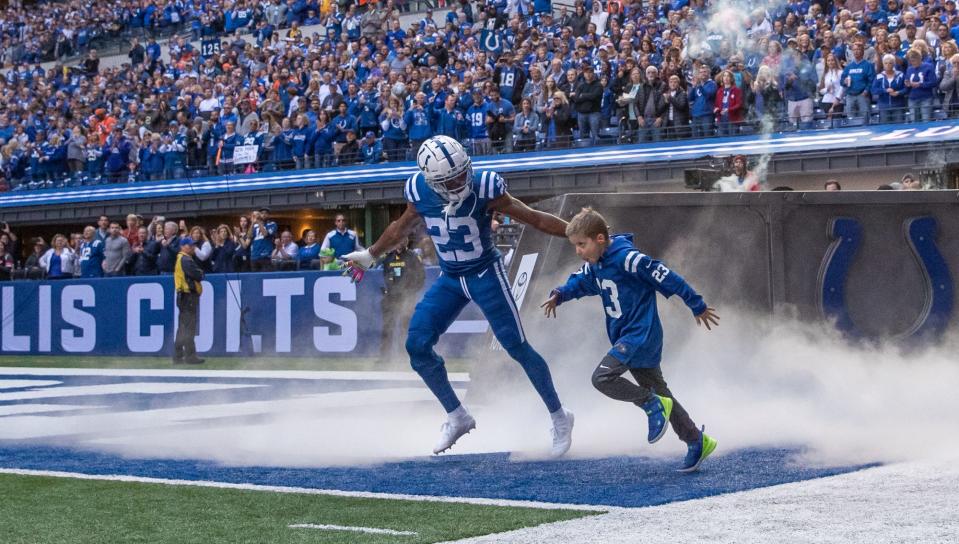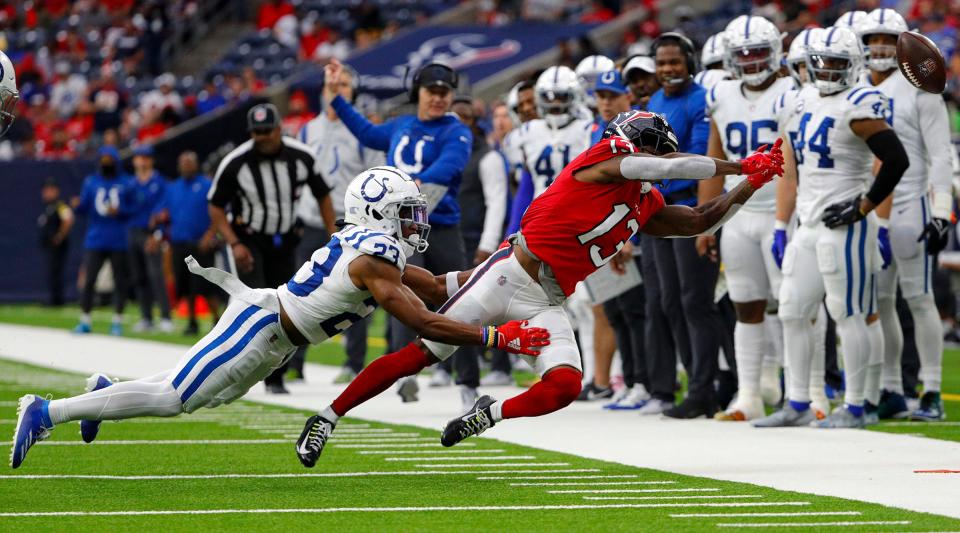How Colts' Kenny Moore II went from a boy scared of hits to Man of the Year
INDIANAPOLIS – Only a few weeks had passed in Kenny Moore II’s first NFL training camp and either he’d had enough of football or football had had enough of him.
He couldn’t quite decide.
But after a long day in the heat, after being outjumped and outmuscled by the veterans of the New England Patriots, Moore II did what boys do when they feel lost: He called his mother.
“Mom,” Moore II said into the phone. “I can’t do this.”
“Kenny,” Angela Carter said from their home in Georgia, “You made it this far. It’s been a hard road, but just stick it out until the very end.”
The end was coming in New England, and Moore II knew it.
"You could hear the sadness in his voice," Carter says now.
New England was where Tom Brady rose from a sixth-round pick into arguably the greatest quarterback ever. Malcolm Butler had come from the same Division II conference as Moore II, played his exact same position and made the greatest defensive play in NFL history.
But these boys wanted to be good at football as badly as they wanted to breathe. That’s what the Patriot Way was about, and Moore II was never going to fit in.
He was the kid who was never big enough. He grew up with six sisters but no brothers to push him down to make him get back up. He didn’t have a father who signed him up for football. And so Moore II didn’t play until his senior year.
Sure, it worked for a year in high school and for four more at Valdosta State, in the Gulf South Conference. But he never got drafted. In New England, where the starting cornerbacks were Pro Bowlers such as Butler and Stephon Gilmore, he knew he never had a chance. He wasn’t built like them, inside or out.
The veterans tried to build him back up. That’s part of the Patriot Way, too. Gilmore, Butler, Eric Rowe and a receiver, Brandin Cooks, kept telling him to stick with it. Guys get cut and that’s just math, but it's not the end.
Getting cut wasn’t what Moore II feared. It was that he deserved. And so when Bill Belichick called him in the office and told him he liked him but didn't have room, Moore II was ready to wave football goodbye.
Then his mother called back with news: The Indianapolis Colts had claimed him off waivers. One more shot to see if he belonged.
He didn’t believe much in that either, but he was a boy who listened to his mom, so he went to the parking lot and waited on a bus to the airport. As he said his goodbyes, he told Cooks the team he was headed to.
“You’re about to go over there and start,” Cooks said.
More: Kenny Moore is the Colts' nominee for Walter Payton Man of the Year
More: Doyel: Get over how the Patriots have disrespected the Colts? Can't do it. Not yet.
More: Doyel: For Colts Kenny Moore, this is a friendship, not a photo op

'Some people believe in you'
Moore II stepped out of the Indianapolis airport into a city he didn’t have to leave. The kid who nearly quit before his first year started is enjoying a breakout season in his fifth, leading all slot cornerbacks with four interceptions.
On a playoff contender, he’s the communicator, telling young cornerbacks from non-Power 5 schools such as Isaiah Rodgers and Rock-Ya Sin to have a little bit of faith.
“With us being undersized guys, a lot of people look at us and think we don’t have that dog in us," Rodgers said, "but Kenny has it and it shows every Sunday.”
He’s passing words on like Cooks once did because they’ve guided each step to now, from special teamer to starting defender to the highest-paid nickel cornerback to the Colts’ Walter Payton Man of the Year.
More: Kenny Moore is the Colts' nominee for Walter Payton Man of the Year
“Some people believe in you before you even believe in yourself,” Moore II said.
He's just 26 years old, but his tone has aged decades. Not only does he believe he deserves to go to the Pro Bowl, he thinks he's overdue.
“It’s not me trying to persuade you or trying to get you to like me. I just want you to call it how you see it and not do the same old. If I’m better than someone, just say that,” Moore II said.
“We can turn our heads all we want, but the numbers don’t lie. I don’t know how long we’re going to do this of not calling it how we see it.”

It doesn’t sound like the kid who asked his mom if he could quit this sport four and a half years ago as a member of the Patriots, the team the Colts will host this Saturday night at Lucas Oil Stadium.
Moore II is a Man of the Year now, and that reality has him thinking about his growth and his name and that II in it and the story of how a small boy’s journey through a gladiator sport began.
'You're too small. Don't do it.'
When Moore II was 14, he finished a hot and physical football practice, sat down in his mother’s car and told her he wanted to quit.
This time, she didn’t push back.
Carter saw what he did out there on the field where three middle school teams converged. Her son was the smallest kid of the group. He was barely 100 pounds back then. The hits were crushing his body.
“He was too small to play football,” said Randy McPherson, the football coach at Lowndes High School, where Moore II was heading next. “That was the bottom line.”
So Carter told her son he could quit football as long as he found other passions and gave them his all. He tried soccer, but when he got injured there, Carter told him to try something less physical. Basketball became the sport.
Her only son and the youngest of seven children, Moore II had an energy level that exceeded all the rest. Carter signed him up for choir, for church ushering, for sport after sport, and he was always game.
“Kenny has always kept me busy,” Carter said. “So I said, ‘You know what? I’ve gotta keep him busy. So that’s what I did.”
This was also about filling the void in a young boy’s life. He had no men around. When Carter and Moore II's father decided to split when he was five, she made a clean break from Valdosta, Georgia, to Miami, packing five kids in a living room.
By the time they moved back to Valdosta five years later, Moore II needed the male companions that sports could bring.
Carter was working multiple jobs, and with little money to go around, Moore II picked up a job selling concessions at Lowndes football games. He saw the full southern high school football scene on display, from the booming bands to the huge video screens, to the Southeastern Conference coaches coming to make kids' dreams come true.
As Moore II traded popcorn bags for slips of cash, he stared into the bright lights and wondered if he was missing something. Then he'd hear a voice in his head.
“’Don’t do it. You’re too small. Don’t do it,’” he recalls. “It was a little frightening. ... “I don’t think people really get what it’s like to be a football player in south Georgia.”
Moore II was a kid who loved skateboards, who tried out for the band and who, as a junior, was becoming something real on a basketball court. After growing more than a foot, he could lock onto opposing players and cover them like a shadow from one end to the other.
People started to notice. McPherson, the football coach and athletic director, told him he’d make a great cornerback if he wanted to give it a try. Moore II still wasn’t feeling it, until a friend of his from chemistry class got kicked off the team at that position and begged him to take his spot.
So he did, for one year of high school. He still wasn’t big, but he was as fast as anyone, and he could stay with them wherever they ran on the field. As he did, a boy took steps he hadn’t before: A man’s voice was in his ear, yelling at him to keep up and to fight on.
“He was like glue,” McPherson said. “You could make him do whatever you wanted him to do.”
Soon enough, Moore II was one of those players running out of the tunnel to the sound of the booming band, and as he basked in the moment and peered up to the packed stands, he saw someone he hadn’t in years.
Kenneth Moore I would nestle into the same spot on the bleachers each week. The father had lived across town, and the two hadn’t spoken since his son was 5, but he showed up to that spot to watch, only to disappear before the game was over.
As the games rolled on, they still didn’t meet or speak, but Moore II kept showing up and making plays, and his father kept coming to watch.
Run the story by Carter now, and she’ll finish the sentence: Even as they moved in silence, it was as if the game of football brought them…
“Together,” she’ll say.
'This is why I play football'
Maybe it needed to be this way. Maybe a boy with six sisters needed to inherit his father’s genes, to be a little undersized, to not play until his senior year, to not receive a single Division I offer, to stay home and play at the Division II school across town, to see his father in the stands and his face in his dreams until he woke up and wanted to meet him again.
As a junior at Valdosta State, Moore II reached out to his father around Thanksgiving, they met and caught up quickly, 15 years flying by. They washed their water under the bridge in hyper speed because they had to.
Kenneth Moore I was dying of kidney and liver damage.
He made it two months beyond their reconnection, when he ended up in the hospital and died there. He was 56.
When his son went to his house to clean up, he found newspaper clippings from all his football games.
"That shaped it for me. 'Dang, this is why I play football,'" he said.
Moore II ran on adrenaline his final year at Valdosta State, picking off five passes and becoming a Division II All-American.
But he went undrafted the next spring. By the time he arrived at Patriots training camp, he was 1,200 miles from home, away from his mother and his six sisters, with no father in the stands anymore.
The Patriots ran a militaristic training camp, sprinting from place to place, smashing shoulder pads and helmets in the old-school drills the sport has since been trying to ban. For the honor of joining Brady and Belichick in the pursuit of Super Bowls, they tested everything a young man had given in his life to the sport that most closely resembled war.
Moore II felt empty.
“I never told myself that this is all I wanted,” he said. “This whole NFL thing came up because it was a kid that was trying his hardest. He didn’t have any expectations. He didn’t have anybody over him saying that this is for you and this is all you have.”
He didn’t see it when he looked in the mirror or slid into his pads. But Cooks did. He had to run against that pesky kid in practice, playing bigger than he ever knew how. So Cooks told him that day at the bus stop.
Moore II made it to Indianapolis, but in order to stay on as a special teamer and a backup, to feel as if he belonged, he needed a piece of his father again. So he started a new ritual before games: He’d step on the field, tap his chest and point to the sky. Then he’d run onto the field so the crowd could see “Moore II” spelled out across the back of his jersey.
The Colts claimed Moore II because they saw beyond a 5-foot, 9-inch, 190-pound body. They saw gangly arms and an acrobatic leap that stretched those limitations. They kept him after his rookie year despite changing coaches, when they thought they were hiring Josh McDaniels from the Patriots, only for him to back out of the job.
Given how the culture rocked him in New England, Moore II was left to wonder what would have happened had that deal gone through. Instead, he was left with the defensive coordinator McDaniels hired in Matt Eberflus, who built a 4-3, Cover-2 defense that treated the nickel cornerback as the glue to hold tight zone concepts together through communication and turnovers.
Thanks to time and repetition and continuity, Moore II has become that player. Since 2018, he's started 53 games and has picked off 13 passes. He's at home in a defense that calls him "Lightning in a Bottle," a symbol he has tattooed behind his left ear.
This spring, the Colts had an open position to fill on the defensive coaching staff and hired James Rowe, one of Moore II's coaches from Valdosta State. Now, Moore II spends cornerbacks meetings in the front row, firing off questions to Rowe and his teammates about everything he sees.
"He can see things before they happen," Rowe said. “It’s almost like having a coach out on the field with how he communicates."
He gives back from a game he didn't think he belonged in. His rekindled relationship with his father taught him that all time is short. He created a bond with Mason Garvey, a young boy with cancer, which lasted through runs out of a tunnel and video games and basketball for two years until Mason died last summer.

He remembers what his mother has told him since the day he tried to quit: “The same way that God blessed you to become a player, he can also take it away.”
His high school coach, McPherson, theorizes now that Moore II’s late start masked how far he could grow. As other seniors in the South were gaining praise from college coaches and recruiting websites, Moore II was the one getting better the quickest.
That Patriots camp was the start, not the end.
“First grade was his senior year,” McPherson said. “I’ve never seen a kid come this far.”
In Indianapolis, Moore II found himself surrounded by people who’d been passed on or not believed in. Frank Reich got the job once McDaniels backed out. Eberflus stayed after his boss bailed. DeForest Buckner was traded from the 49ers. Darius Leonard played at South Carolina State before he blossomed into an All-Pro.
Now they have conversations for the world to see on "Hard Knocks."
“They bring in a lot of different guys who have the same personality,” Moore II said. “It’s pretty weird, but it’s pretty cool at the same time to come together from so many backgrounds and locations."
He’s met regularly with the Colts’ team therapist since he arrived. His days in New England are now his story, which he shares as a spokesman for owner Jim Irsay's mental health initiative called "Kicking the Stigma."
"You can tell yourself you're perfect, but good luck," Moore II said. "I think not having pride and just being vulnerable to expressing another level of yourself is very important because people see us athletes as gladiators and robots and we’re not really supposed to do anything else but play football and win games.
“We have a switch in our lives. We have a switch to come to work, play football and put a horseshoe on. And we have another switch of being a son, a brother, a dad."
Part of being the Man of the Year on this team is being open to living with doubt. That part of him he'll never fully outgrow. Behind the sack dances, fancy cars and silver chains, he'll still be a 5-foot-9 kid looking up in the game of football.
Leonard lives at the center of the on-field trash talk, and two weeks ago, he noticed Moore's energy dipping as opponents threw barbs and he wasn't blitzing or intercepting the ball enough to answer them without words.
"I encourage him to understand that you are who you are," Leonard said. “So much bad talk had been said to him. ... Sometimes you get in your own head. So I just let him know that, ‘You are the smallest thing on the field, but you make a ton of plays.’”

The next game was against the Houston Texans. On the first play, Moore II lined up in the slot, and out of the corner of his eye, he saw an old friend across the line: Brandin Cooks.
Cooks took his man deep and Moore II trailed his on an out route to the sideline. Tyrod Taylor tossed a lazy pass anyway and Moore II exploded like a jackrabbit to the ball before dragging his feet in bounds for the interception.
The Colts won the game 31-0, thanks to two Moore II turnovers. After the game, Moore II had a moment with Cooks again, four years after their chat at the bus stop. He thanked him for seeing something he can finally see in himself.
For Moore II, this has never been about proving anyone wrong.
“You want to prove everyone around you right,” he said.
Contact Nate Atkins at natkins@indystar.com. Follow him on Twitter @NateAtkins_.
This article originally appeared on Indianapolis Star: Colts: Kenny Moore II went from boy scared of hits to Man of the Year
